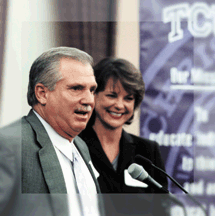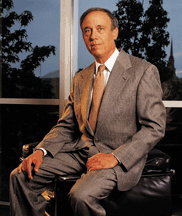|
Additional Articles:
Business
partners |
Business
ventures

 |
| Sharing
the business plan. At a luncheon and press conference announcing
a $10.5 million gift from Steve and Sarah Smith, the couple expressed
their joy in being part of the entrepreneurial push at TCU. |
We
sit smack in the middle of the richest entrepreneurial breeding ground
in the nation. At least that's what Entrepreneur Magazine and Dun and
Bradstreet said in October in their seventh annual ranking of the Best
Cities in the Nation for Entrepreneurship.
This news
hasn't been lost on the M. J. Neeley School of Business. Just one year
ago, the Center for Entrepreneurial Studies was launched with a $2 million
bequest from businessman William Dickey '33. Then Jim Ryffel '81 (MBA
'84, RM '98) brought $5 million more to the table, followed only six months
later by a $10.5 million gift from Steve and Sarah Smith to build a home
for the center.
Is this a
story about a couple who gave money to TCU? Yes. In fact they gave the
largest gift ever to the University by a living donor. Yet, this is also
a story about the spirit of entrepreneurship, about giving back, about
building something wonderful. Simply put, it's a story about people who
want to be part of something bigger than themselves.

Business Plan
By Nancy
Bartosek
Put us in the top tier.
 The
charge to move the M.J. Neeley School of Business into the national top-50
rankings was clear to Robert Lusch when he agreed this summer to migrate
from the University of Oklahoma to TCU. The
charge to move the M.J. Neeley School of Business into the national top-50
rankings was clear to Robert Lusch when he agreed this summer to migrate
from the University of Oklahoma to TCU.
The appointment of Lusch, one of the top-five
marketing scholars in the nation, was considered a coup for the Neeley
School, and he's taken the top spot in the school with confidence.
"Everything we do has to tie into the
TCU mission, not only because it's right, but because it's critical to
our future," the soft-spoken dean said.
"We feel that if we improve the quality
of the business school -- and specifically put a lot of focus on the MBA
program -- that will allow us to improve the stature of the overall university.
If we invest in the business school, after awhile we'll become a cash
cow. And that's fine, we ought to pay a tax when we become successful."
Chancellor Michael R. Ferrari agrees.
"Nearly one-fourth of our students are
enrolled [in the business school], and if TCU is to gain greater national
and international stature, it is imperative that the Neeley School be
viewed among the leading business schools in the country. The increased
visibility will also raise the level of recognition of other programs
at TCU.
"I might also say that the future of Fort
Worth is tied to the success of the Neeley School. For Fort Worth to achieve
its aim to be attractive for economic and business development and to
become a thriving global center, it is critical that there be a high-quality
business school in the city. We aspire to be that kind of partner."
It is not a goal without challenges. While
support from the trustees and administration is solid, Lusch knows there
are many who find the prospect of funneling resources toward the business
school less than appealing. And, he adds, the nation's top business schools
aren't going to "roll over and play dead" while we try to catch up.
"Harvard's annual budget is $250 million,
and that's for 1,700 students," Lusch said. "UT raised $50 million over
the summer. I'm not saying we should try to duplicate that, but we hope
to ratchet-up our operating budget and then increase the endowment."
While adding millions to the University's
coffers is a long-term goal, Lusch knows you can't just buy your way into
the fraternity of top schools. "It takes more than money," he said.
"It takes good ideas too, and that's where
we think we can win."
Those bright notions start with the MBA
program. The eight faculty who teach the core first-year courses of the
graduate program meet together weekly to weave their syllabi together.
"They talk about what they each are covering,
say in accounting, and see how someone else can put that together with
what is covered in say, marketing or finance," Lusch said. "They're not
separate disciplines, they work together overall." The undergraduate curriculum
is now getting a thorough work-over to become more contemporary.
"It's not a bad curriculum; everything
we talk about is correct," he said, "but we're not doing the job we need
to of integrating that curriculum so it's a whole."
Integrating Neeley with the rest of the
university is also being explored, perhaps developing dual-degree programs
such as an MBA in conjunction with a graduate degree in education, health
care administration, languages or environmental sciences.
Neeley, designated one of TCU's "centers
of excellence" by Chancellor Ferrari, is also clarifying what its own
high points will be. Three at the forefront are the Ryffel Center for
Entrepreneurial Studies as well as the development of integrated centers
in finance and supply management.
With those big ideas, Lusch knows he must
add the faculty and facilities needed to attract top-notch students.
"The bottom line is that if within five
years we don't have an additional four endowed chairs and an additional
four endowed professorships, we won't be on track," he said.
The Neeley task force report for the Commission
on the Future of TCU listed a new 50,000-square-foot facility as necessary
if the school plans to reach its reputational goals.
It's all possible, Lusch said. "If we're
successful at the Neeley School, it comes back many times over to the
university because successful business leaders' interests move way beyond
business.
"You look at virtually every [major] gift
at TCU over the past 50 years and they come from people in industry."
Lusch knows he arrived at a pivotal point
in Neeley's future. The Metroplex is exploding into this century -- and TCU
needs to keep pace.
"I think there would be a big risk over
the next 10 or 20 years, given the continued growth of Tarrant County,
if we didn't really say 'Let's become prominent and recognized,' " Lusch
said. "If a chancellor came in the year 2020 and said, 'Lets do it now,'
it would be too late."

Business
History
1884:
Under some scrutiny and vocal concern, the Commercial School is established,
offering such subjects as accounting, commercial arithmetic and commercial
law.
1892:
The school's enrollment reaches 110, and it becomes the College of
Business.
1922:
The department of business administration is added to AddRan College
of Arts and Sciences, where bachelors of arts in business administration
are offered.
1938:
The department of business administration becomes the School of Business
and the first MBA is offered. Certificates in accounting, general
business and secretarial science were also offered.
1944:
The School's first dean, E.M. Sowell, a Harvard Business School graduate,
is appointed by President Sadler. The program offerings grow under
Sowell to include advertising, personnel administration and industrial
relations and marketing, to name a few. Sowell resigns in 1954.
1951:
The Southwest Business Foundation (SWBF) is chartered as a nonprofit
education and civic corporation, with Marion J. Neeley (appointed
trustee in 1947) as president. Its goal is to encourage support for
the school, establish scholarships and connect the school to the community.
In 1953 the SWBF begins a fund to build a new home for the school.
1957:
Dan D. Rogers Hall, named for a former trustee, is dedicated, replacing
barrack quarters the school has been housed in. Several other departments
share the new building, which cost $825,000.
1967:
The School of Business is renamed the M.J. Neeley School of Business
in honor of the man who, as trustee, led one of TCU's most aggressive
building programs in history from 1951 to 1970.
1989:
Tandy Hall dedicated. 1999: TCUglobalcenter at Alliance is opened,
offering off-site executive education MBAs and seminars at Alliance
Airport.

Be
sure to read Business Partners and Business
ventures
Top
|



